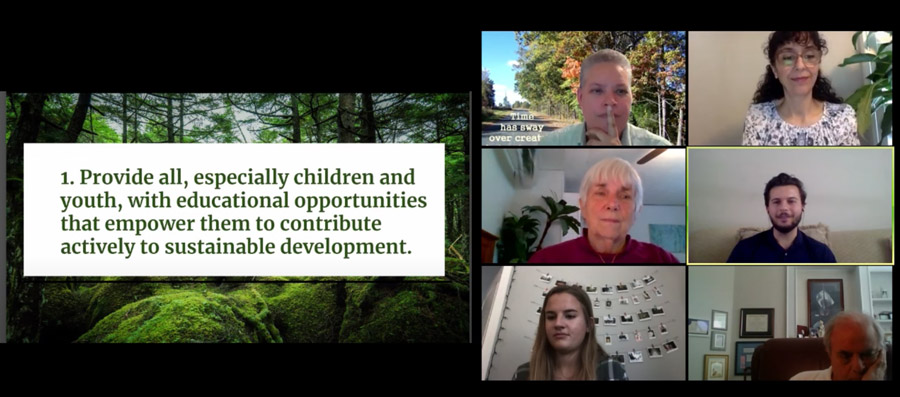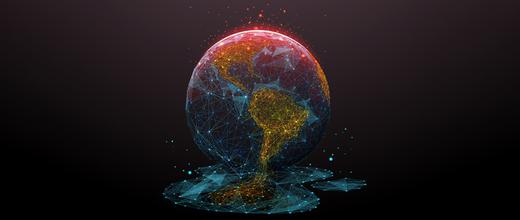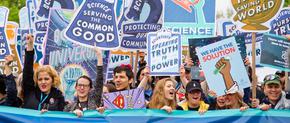The views expressed in our content reflect individual perspectives and do not represent the authoritative views of the Baha'i Faith.
Can we cultivate new patterns of thinking and action during the coronavirus pandemic, and work against climate change?
The coronavirus has offered opportunities for us to reflect on our values and habits, and decide on what changes we want to make in our lives. Staying home has made me think about the beauty of the world we live in and how our actions are tarnishing what many of us take for granted.
Humans are negatively affecting the world’s equilibrium and degrading our symbiotic relationship with the organisms we cohabitate with. But the pandemic has shown that some of this damage is reversible: for example, it was wildly reported in the news that in the Indian state of Punjab, the Himalayan mountain range is visible for the first time in decades due to the drop in air pollution from a country-wide lockdown.
As I gain more knowledge of the science behind anthropogenic (human-caused) climate change, I’m reminded of one of my favorite passages from the Baha’i teachings regarding humanity’s relationship with nature and the interconnectedness of Earth. Abdu’l-Baha, the son of Baha’u’llah, the prophet and founder of the Baha’i Faith wrote:
“Even as the human body in this world which is outwardly composed of different limbs and organs, is in reality a closely integrated, coherent entity, similarly the structure of the physical world is like unto a single being whose limbs and members are inseparably linked together… Co-operation, mutual aid and reciprocity are essential characteristics in the unified body of the world of being, inasmuch as all created things are closely related together and each is influenced by the other or deriveth benefit therefrom, either directly or indirectly.”
As a Baha’i, I believe it is my responsibility to be a caretaker of the Earth not only for my safety, but for my children and grandchildren, not to mention the millions of people around the world who are already affected by climate change — especially those in poverty. Baha’u’llah also advised us to “be anxiously concerned with the needs of the age ye live in, and center your deliberations on its exigencies and requirements.”
Our interdependency as interconnected world citizens, particularly as seen during the coronavirus pandemic, was also pronounced in the preamble of The Earth Charter, an international declaration of principles launched in 2000 for building a just, sustainable, and peaceful world. It states: “Everyone shares responsibility for the present and future well-being of the human family and the larger living world.”
Before we can act, we must all understand what we are working for and the impact of our actions. Education must be a precursor to action. But words alone aren’t enough.
Over the past two months, I have worked with We, the World and Elders Climate Action on an intergenerational climate conversation to plan how we can educate everyone, regardless of age, faith or background, on the importance of fighting against climate change. By enlightening individuals about the effects human activities have on the rapidly warming Earth, and cultivating patterns of action, we can decrease our future impact — and maybe even reverse the actions of past generations as well as our own.

As a first step, our group took part in an online panel discussion with the Wilmette Institute. We discussed some of the ways youth and elders can collaborate on the movement for environmental justice. Events like this one help us “integrate into formal education and life-long learning the knowledge, values, and skills needed for a sustainable way of life,” as declared as principle 14 of The Earth Charter. I look forward to continuing our efforts together for a more sustainable future, particularly during these difficult times.
As Abdu’l-Baha said in a speech in Colorado in 1912, “The supreme need of humanity is cooperation and reciprocity. The stronger the ties of fellowship and solidarity amongst men, the greater will be the power of constructiveness and accomplishment in all the planes of human activity.”
Now that we have seen the effects changing our outlook and behavior can have on our climate, why should we wait until the next calamity to practice it widely? Let’s make cooperation and togetherness the new normal, acknowledging that we all have a role to play in ensuring the well-being of life on Earth.

















Comments
Sign in or create an account
Continue with Facebookor